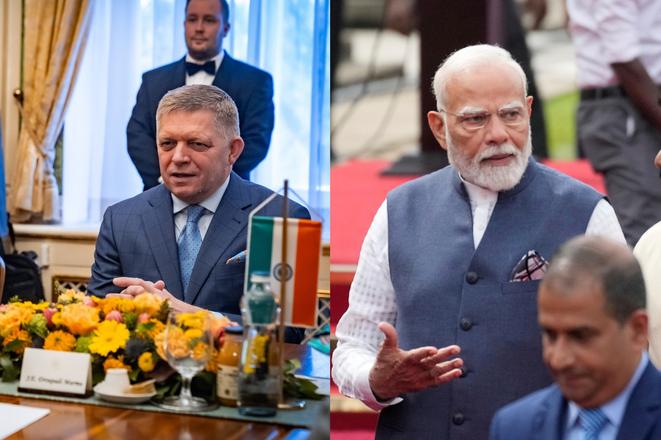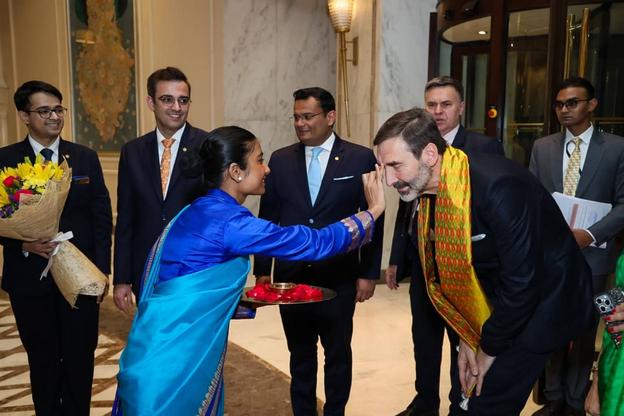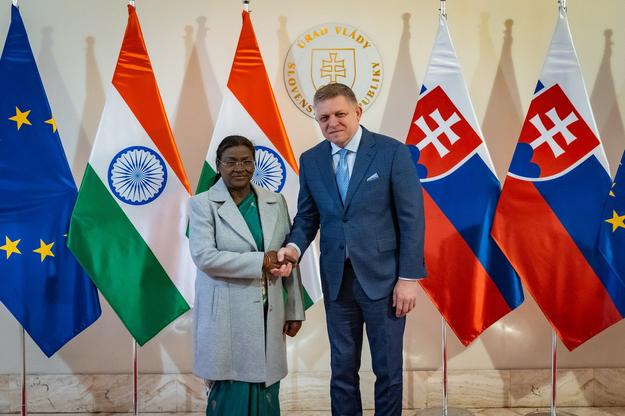Amit Singh is a research fellow at the Institute of European Studies and International Relations, Comenius University in Bratislava. He is also a Sylff fellow at the Tokyo Foundation for Policy Research in Japan and a recipient of a Slovak national scholarship. He holds a PhD in Human Rights from the Centre for Social Studies at the University of Coimbra. Singh writes on right-wing populist politics in India and Europe and is the author of “An Approach to Hindutva in India”.
Despite differences in geography, political systems, and population size, India and Slovakia have both experienced hegemonic domination by powerful empires, albeit in different historical periods. India was colonised by the British, whereas Slovakia was incorporated into various empires. In both countries, nationalism emerged despite the absence of a distinct nation state. Nevertheless, nationalism—particularly ethno-nationalism—has played a divisive role in both nations through the activities of far-right and radical right parties and organisations.
Although far-right populist parties and organisations in India and Slovakia have evolved under distinct circumstances, their political behaviour, especially with regard to the majority population, exhibits notable parallels. These include anti-democratic tendencies, Islamophobic sentiment, an emphasis on ethno-nationalism, and populist rhetoric. Generally, far-right and radical right parties and organisations are driven by nativism, which shapes their attitudes towards the ‘other’.
In Slovakia, parties such as SNS (Slovenská národná strana – Slovak National Party), ĽSNS (Ľudová strana Naše Slovensko – People’s Party Our Slovakia), Republika, and the civic association Slovenská pospolitosť (“Slovak Togetherness”) exemplify this trend. In India, their counterparts include the BJP (Bharatiya Janata Party – Indian People’s Party), the Rashtriya Swayamsevak Sangh (RSS – a Hindu cultural militia), and Shiv Sena.
In both Slovakia and India, the politics of ethno-nationalism have dominated the mainstream political landscape for at least the past decade. Radical right and extremist parties and groups in both countries have enforced an ethnic and territorial conception of identity. Hindu nationalism in India and Slovak nationalism share a foundation in cultural and ethnic chauvinism, with the majority populations perceiving their nations through an ethnocentric lens. These groups have promoted and mainstreamed the idea of a ‘nativist’ state, advocating for its exclusive governance by members of their respective native groups.
For instance, Hindu radical right groups such as the RSS assert that India belongs exclusively to Hindus, considered the indigenous people of the nation. This ideology posits that only a Hindu should rule the country, thereby denying rights—including citizenship—to religious and ethnic minorities. In Slovakia, radical right groups such as Marián Kotleba’s ĽSNS promote the exclusion of Muslim, Hungarian, and Roma communities from the definition of the Slovak nation.
In Slovakia, radical right and extremist groups portray Muslim communities as a threat to the purity of Slovak Christian culture. Similarly, in India, Hindu nationalists frame Muslim communities as threats to Hindu culture, religion, and national identity. In both cases, these groups oppose diversity and pluralism, advocating instead for a homogeneous Christian or Hindu identity. Consequently, elements deemed non-indigenous—whether linguistic, cultural, or religious—are excluded from political discourse. This exclusion has led to the dehumanisation of ethnic and religious minorities, particularly Muslims, whose religion and culture are seen as foreign, threatening, and incompatible with the national identity.
The current Slovak state, under Robert Fico, is promoting a homogenous political ideology centred on national pride, Christian values, and Slovak folklore, aiming to suppress political pluralism and minority rights. This pattern mirrors the governance of the Modi government in India.
Since Robert Fico’s return to power in 2023, Slovakia has witnessed the erosion of the rule of law and the reshaping of state institutions. His ruling coalition comprises Smer, Hlas (Voice—the party of the current president, Peter Pellegrini), and SNS (Slovak National Party), which range from right-wing populist to far-right. Fico’s leadership is marked by increasingly authoritarian tendencies, including tight control over central institutions and a foreign policy that is strongly aligned with Russia and China. Civil society and NGOs are also facing growing intimidation.
India’s current government, led by Prime Minister Modi and driven by a radical right-wing Hindu nationalist ideology, is on the verge of establishing a Hindu authoritarian state. Ongoing human rights violations against religious minorities and marginalised groups, restrictions on academic and press freedom, and repression of civil society and the media indicate a shift away from democratic principles. India is now classified as a ‘partially free’ country. The BJP has largely co-opted the state apparatus, including the police, judiciary, election commission, national human rights commission, secret service agencies, and cultural institutions. This mirrors developments in Slovakia, where the SNS culture minister, Martina Šimkovičová, dismissed the directors of the Slovak National Theatre and Slovak National Gallery to assert control over major cultural institutions. A concerted crackdown on artistic expression and a systematic assault on Slovakia’s state institutions continues under Fico’s government.
Under Modi’s leadership, the distinction between the state and its leader has blurred. Criticism of Modi or the BJP is construed as an attack on the nation itself and is often met with reprisal. This reflects the hallmarks of an authoritarian state. The rewriting of history textbooks to exclude chapters on secularism, democracy, and social movements further exemplifies the Hindu nationalist government’s attempt to suppress dissent and manipulate India’s historical narrative.
A similar phenomenon has been observed among Slovak radical right and extremist groups, who exhibit strong tendencies towards historical revisionism. Slovak nationalists often mythologise and ethnicise their interpretation of national history, portraying the Slovak nation as far older than current scholarship suggests. This is comparable to Hindu nationalists’ attempts to link Hindus to the ancient Harappan civilisation. These efforts include introducing the concept of 'ancient Slovaks' to challenge the established scientific consensus on Slovak ethno-genesis. In both contexts, radical nationalists seek to reshape the ethno-nation by distorting historical folklore and mythology to serve a nationalistic and authoritarian agenda.
While segments of the Slovak population occasionally support radical right parties, civic nationalism appears to be the dominant ideology, with ongoing opposition to Fico’s government suggesting a public commitment to liberal democracy. In contrast, the Indian resistance movement has not yet succeeded in effectively challenging the Modi government’s authoritarian policies. Although farmers, students, and opposition politicians have voiced strong dissent, the state has managed to neutralise their efforts through coercion, vilification, and institutional control.
Unlike the relatively unified opposition to Fico in Slovakia, Indian society—particularly the Hindu majority—is deeply divided along caste and religious lines, with a conservative attitude toward secular democracy. This has enabled parts of the population to support the Modi government’s transformation of India into an ethno-Hindu state. Consequently, the country is now classified as a ‘hybrid regime’ by DemocracyMatrix.com.
It is evident that in both India and Slovakia, radical right parties have contributed to authoritarian governance, characterised by centralised power, suppression of independent media, disregard for the rule of law, marginalisation of minorities, and attacks on civil society. Nationalist and nativist sentiments dominate the public sphere, fostering resentment towards religious minorities and dissenters and making the majority population more susceptible to radical right ideologies. In this sense, Slovak nationalism on various levels appears comparable to Hindu nationalism.
The Slovak Foreign Minister has visited India in each of the past three years—2023, 2024, and 2025—and the Indian President is visiting Slovakia in April. Moreover, Prime Minister Robert Fico on Wednesday, April 9, invited Indian Prime Minister Narendra Modi to visit Slovakia. These growing political ties may be seen as an attempt to cultivate friendly ideological relations between the ruling far-right parties of Slovakia and India.


 Slovak PM Robert Fico (left) and Indian PM Shri Narendra Modi (right) (source: Facebook/TASR/AP )
Slovak PM Robert Fico (left) and Indian PM Shri Narendra Modi (right) (source: Facebook/TASR/AP )
 Slovak Foreign Minister Juraj Blanár during his visit to India in March 2025. (source: Facebook)
Slovak Foreign Minister Juraj Blanár during his visit to India in March 2025. (source: Facebook)
 Slovak Prime Minister Robert Fico (right) shakes hands with Indian President Droupadi Murmu during her visit to Bratislava in early April 2025. (source: Facebook - Robert Fico)
Slovak Prime Minister Robert Fico (right) shakes hands with Indian President Droupadi Murmu during her visit to Bratislava in early April 2025. (source: Facebook - Robert Fico)